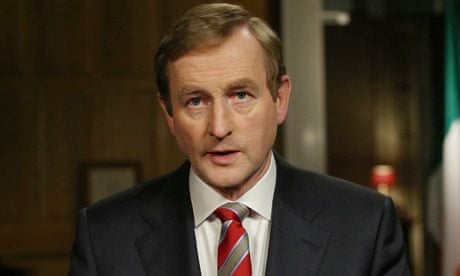The Irish premier, Enda Kenny, thanked the Irish people on Sunday night for putting up with three years of IMF-EU imposed austerity but warned that prudent budgets would continue under his administration.
In a live address to mark the Republic's departure from the IMF-EU multi-billion euro bailout programme this weekend, the Taoiseach said that "we must continue to pursue prudent budgetary policies".
Kenny said that under the bailout programme "many families have also had to face the devastating consequences of unemployment and emigration".
He said that thanks to the efforts of ordinary people the country was able to exit the programme.
"I thank you for the part that you have played in Ireland's recovery to date," he said in his television address on RTE One.
Kenny said that the Fine Gael-Labour coalition would publish a medium-term economic plan later this week to generate more jobs.
"The creation of jobs will be at the heart of the plan … by increasing total employment to over 2 million people by 2020, we can replace all of the jobs that were lost," he said.
Kenny said: "Throughout our history, the Irish people have already shown that nothing is impossible for us to achieve, when we really apply ourselves to a challenge or course."
On the credit-fuelled boom in property that caused the crash, particularly in the Irish banking sector, the Taoiseach added: "We are never going back to that culture."
The Republic received more than €67bn (£56.5bn) from the IMF and the EU to rescue the state from bankruptcy after the Celtic Tiger economy collapsed. In return the country had to endure cuts of billions of euros to social welfare, public sector wages and pensions, and the scrapping of many capital spending projects.
Under the programme the coallition government has to raise an extra €5.3bn in taxes and reduce public spending by €9.6bn.
With Ireland becoming the first eurozone country to exit the bailout programme, Kenny is expected to acknowledge the sacrifices that the Irish people have made over the past three years.
Over the weekend his ministers have been lining up to depict the Irish people as the "heroes and heroines" of the crisis.
Kenny's finance minister, Michael Noonan, has warned that there is still a "tough road ahead" for the Republic despite the exit from the bailout.
Noonan said, however, that leaving the programme would create "a change in perspective" towards Ireland around the world, particularly in the international money markets. He also predicted that the next estimate of Ireland's standing by ratings agency Moody's next month would be more favourable.
Before the banking crash of 2008, Ireland had near full employment but was gorging on credit and fuelling in turn a massively overheated property boom. By the time the IMF and EU came into Ireland to bail the nation out, unemployment had soared to 15%.
